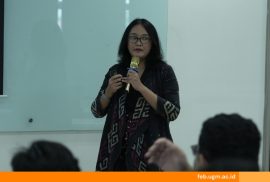Tuesday (15/10) the Faculty of Economics and Business Universitas Gadjah Mada (FEB UGM) together with The Indonesian Association of Islamic Economist (IAEI) and the Financial Services Authority (OJK) collaborated to hold the Sharia Economic and Financial Research Forum (FREKS) 2019. The event, which was held at the Sukadji Ranuwihardjo Auditorium, Master in Management FEB UGM was motivated by the development Islamic financial industry which is increasingly complex in the future, and needs to continue to make breakthroughs that can encourage the growth of Islamic finance more quickly, stable, efficient, and competitive.
This event carries the theme of “Increasing Sharia Financial Competitiveness through Innovation and Synergy Towards Responsible Finance and Investment (RFI) in the framework of Supporting National Economic Growth Acceleration”. The theme contains the meaning and hope that the Sharia Finance Industry can implement RFI so that it is able to compete and work together in encouraging the acceleration of national economic growth.
The ongoing FREKS event includes a series of activities, among them is the presentation of 22 finalists of call for papers, which are divided into 3 levels, namely young researchers, middle researchers and Scopus researchers; seminar activities from prominent speakers; seminar activities related to sharia economics and finance, and the side event of the Hospitality Forum for the Study of Islamic Economics (FoSSEI).
Along with the event, the launch of a new concentration was also held, namely the Islamic Accounting Concentration in the Master of Accounting FEB UGM Program. In his remarks, Prof. Ir. Panut Mulyono, M. Eng., D. Eng., IPU., ASEAN Eng. (Rector of UGM) said that with the development of this concentration it was hoped that Islamic economics and finance could become a very large economic force. This is because Indonesia is a country with the largest number of Muslims in the world. The same thing was conveyed by Trisaktiana M.S (Representative of the Governor of DI Yogyakarta Province) that with the existence of the new study program, UGM as the axis of Merapi in divinity will have a stronger relationship.
The Keynote Speaker at the event was Astera Primanto Bhakti (Director General of Fiscal Balance at Ministry of Finance). Astera said that in line with the Sustainable Development Goals (SDGs) program promoted by the government and the awareness of socially responsible behavior created a new paradigm in Islamic economic development. Implementation in government program planning is reflected in the Medium Term Development Plan (RPJMN) which has an incision with the Islamic economy. Indonesia is a country with the largest number of Islamic institutions in the world and be the pioneer in retail sukuk issuance. However, the market share was only at 5.8% of all national banking assets. This achievement is still far below the Arab Saudi, Malaysia, and the United Arab Emirates. Therefore, there is a need for strong research and development as well as the link and match of research and demand of the Islamic industry.
In the discussion, Ir. Hoesen, M.M. (Member of the Board of Commissioners, Financial Services Authority) said that with attention to finance and sustainable investment, there was an opportunity to focus on responsible financial investing. For example by exploring the potential of sharia, in the form of social funds, endowments, and alms. Hoesen considered that Indonesia as the country with the best halal tourism should not be complacent and must continue to make inroads. The Financial Services Authority (OJK) as a financial services industry watchdog continues to commit to conducting research forums. The strategy for developing the financial industry, which includes strengthening Islamic financial institutions, creating sustainable demand, and building an Islamic financial ecosystem.
Source: Sony Budiarso/Leila Chanifah Zuhri




